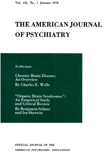A PRELIMINARY REPORT ON THE CONTINUED POST-HOSPITAL USE OF TRANQUILIZING DRUGS
Abstract
A sample of patients discharged from a state hospital was interviewed at regular intervals; this preliminary report includes information obtained at the 6 months' follow-up. In addition to an evaluation of observed, objective well-being ("adjustment"), information was obtained from the patients concerning their continued use of tranquilizing medicine.
1. very large percentage of patients are discharged with the recommendation that they continue on a regime of tranquilizing medication.
2. As time goes on, the percentage of patients who follow this advice decreases significantly, and even those who report that they continue to use the tranquilizing drugs become less "regular" in their medical regime.
3. In this study no conclusive evidence could be found that patients remaining on a tranquilizing drug did any "better" than those who did not: there is no significant difference in the rehospitalization rate, nor is there a significant difference in their observable functioning in the community. Therefore where the tranquilizing drugs have shown their effectiveness in the hospital, for the post-hospital period other means than purely medical treatment seem more effective in promoting recovery.
4. Many patients seek the advice of a physician in the community, under whose care they continue their tranquilizing drug regime. Nevertheless, even after 6 months, there is a significant number who apparently can get their original prescriptions refilled for a long time without the supervision of a local physician.
5. The study was able to show that with relatively little effort on the part of a few professional workers with discharged patients, a closer cooperation with local individuals and agencies (physicians, psychiatrists, clinic, etc.) can be obtained, showing as a result a higher percentage of patients who continued to take prescribed drugs as well as a higher percentage who take them "regularly."
Access content
To read the fulltext, please use one of the options below to sign in or purchase access.- Personal login
- Institutional Login
- Sign in via OpenAthens
- Register for access
-
Please login/register if you wish to pair your device and check access availability.
Not a subscriber?
PsychiatryOnline subscription options offer access to the DSM-5 library, books, journals, CME, and patient resources. This all-in-one virtual library provides psychiatrists and mental health professionals with key resources for diagnosis, treatment, research, and professional development.
Need more help? PsychiatryOnline Customer Service may be reached by emailing [email protected] or by calling 800-368-5777 (in the U.S.) or 703-907-7322 (outside the U.S.).



